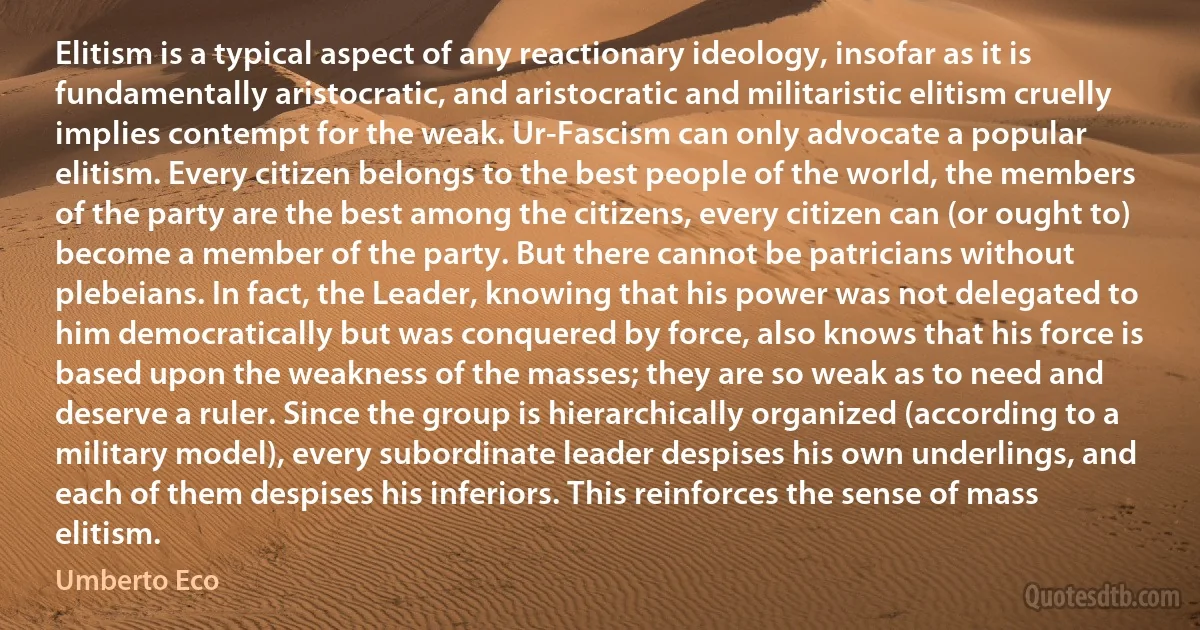
Elitism is a typical aspect of any reactionary ideology, insofar as it is fundamentally aristocratic, and aristocratic and militaristic elitism cruelly implies contempt for the weak. Ur-Fascism can only advocate a popular elitism. Every citizen belongs to the best people of the world, the members of the party are the best among the citizens, every citizen can (or ought to) become a member of the party. But there cannot be patricians without plebeians. In fact, the Leader, knowing that his power was not delegated to him democratically but was conquered by force, also knows that his force is based upon the weakness of the masses; they are so weak as to need and deserve a ruler. Since the group is hierarchically organized (according to a military model), every subordinate leader despises his own underlings, and each of them despises his inferiors. This reinforces the sense of mass elitism.
Umberto EcoRelated topics
aspect best contempt force ideology knowing leader mass model need ought party people power reactionary sense subordinate typical weakness world elitismRelated quotes
We must be prepared to accept the will of God. The Lord permits all sorts of things to happen to us contrary to our will, for if we always have it our way, we will not be prepared for the Kingdom of Heaven. Neither heaven nor earth will receive those who are self-willed.
God has a Divine plan for each one of us, and we must submit to His plan. We must accept life as it is given to us, without asking, "Why me?” We must know that nothing on earth or in heaven ever happens without the will of God or His permission. We must not become too engrossed with our hardships but concentrate on preserving our inner peace.
Even when we are praying for something, we are trying to force our will instead of accepting God's. All hardships and sorrows that God sends us are necessary for us, but we do not understand this when we are young. When we are older, then we understand that this is the way God shows His love for us.

Tadej of Vitovnica
He loved his profession, he had a real sense of dedication to the administration of justice, he held his head high as a lawyer, he rendered and exacted courtesy, honor and straightforwardness at the Bar. He respected the judicial office deeply, demanded the highest standards of competence and disinterestedness and dignity, despised all political use of or trifling with judicial power, and had an affectionate regard for every man who filled the exacting prescription of the just judge. The law to him was like a religion, and its practice was more than a means of support; it was a mission. He was not always popular in his community, but he was respected. Unpopular minorities and individuals often found in him their only mediator and advocate. He was too independent to court the populace - he thought of himself as a leader and lawgiver, not a mouthpiece.

Robert H. Jackson
From what can "ought" be derived. The most compelling answer is this: ethics must be somehow based on an appreciation of human nature - on a sense of what a human being is or might be, and on what a human being might want to have or want to be. If that is naturalism, then naturalism is no fallacy. No one could seriously deny that ethics is responsive to such facts about human nature. We may just disagree about where to look for the most compelling facts about human nature -n novels, in religious texts, in psychological experiments, in biological or anthropological investigations. The fallacy is not naturalism but, rather, any simple-minded attempt to rush from facts to values. In other words, the fallacy is greedy reductionism of values to facts, rather than reductionism considered more circumspectly, as the attempt to unify our world-view so that out ethical principles don't clash irrationally with the way the world is.

Daniel Dennett
In 1946, a Macy Foundation interdisciplinary conference was organized to use the model provided by "feedback systems," honorifically referred to in earlier conferences as "teleological mechanisms," and later as "cybernetics," with the expectation that this model would provide a group of sciences with useful mathematical tools and, simultaneously, would serve as a form of cross-disciplinary communication. Out of the deliberations of this group came a whole series of fruitful developments of a very high order. Kurt Lewin (who died in 1947) took away from the first meeting the term "feedback". He suggested ways in which group processes, which he and his students were studying in a highly disciplined, rigorous way, could be improved by a "feedback process," as when, for example, a group was periodically given a report on the success or failure of its particular operations.

Margaret Mead
In the human reality, all existence that spends itself in procuring the prerequisites of existence is thus an "untrue” and unfree existence. Obviously this reflects the not at all ontological condition of a society based on the proposition that freedom is incompatible with the activity of procuring the necessities of life, that this activity is the "natural” function of a specific class, and that cognition of the truth and true existence imply freedom from the entire dimension of such activity. ... Society still is organized in such a way that procuring the necessities of life constitutes the full-time and life-long occupation of specific social classes, which are therefore unfree and prevented from a human existence. In this sense, the classical proposition according to which truth is incompatible with enslavement by socially necessary labor is still valid.

Herbert Marcuse
